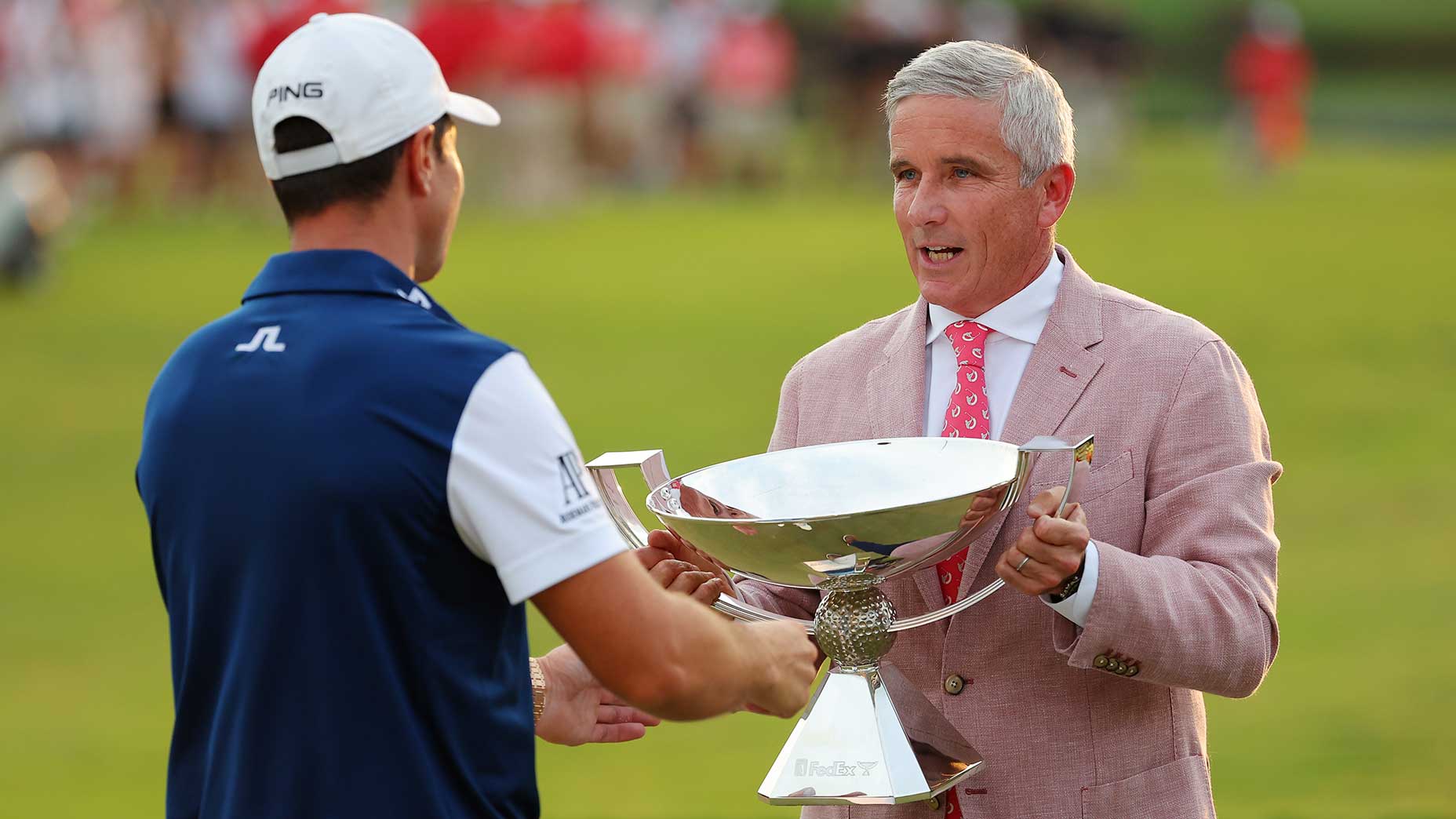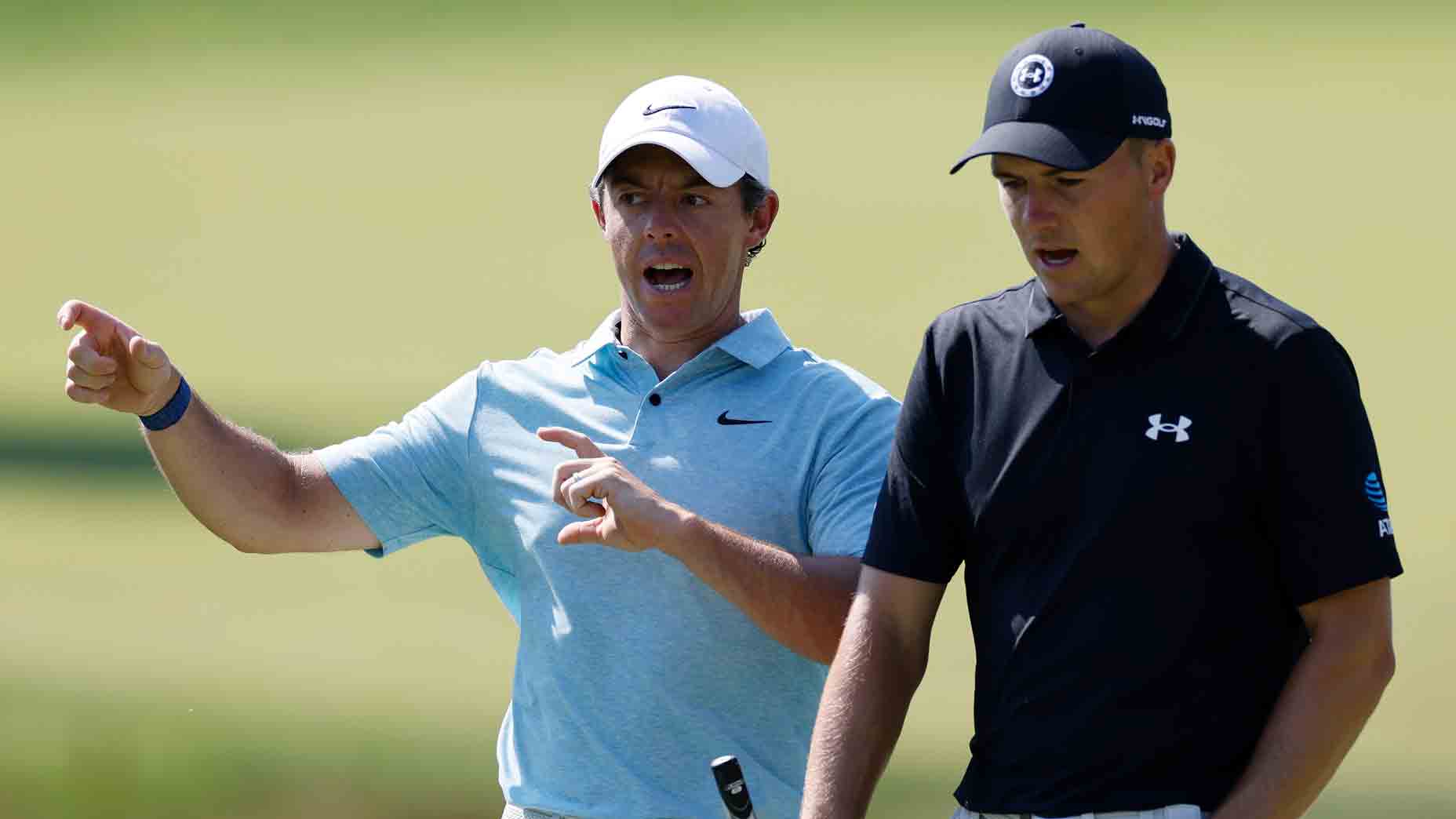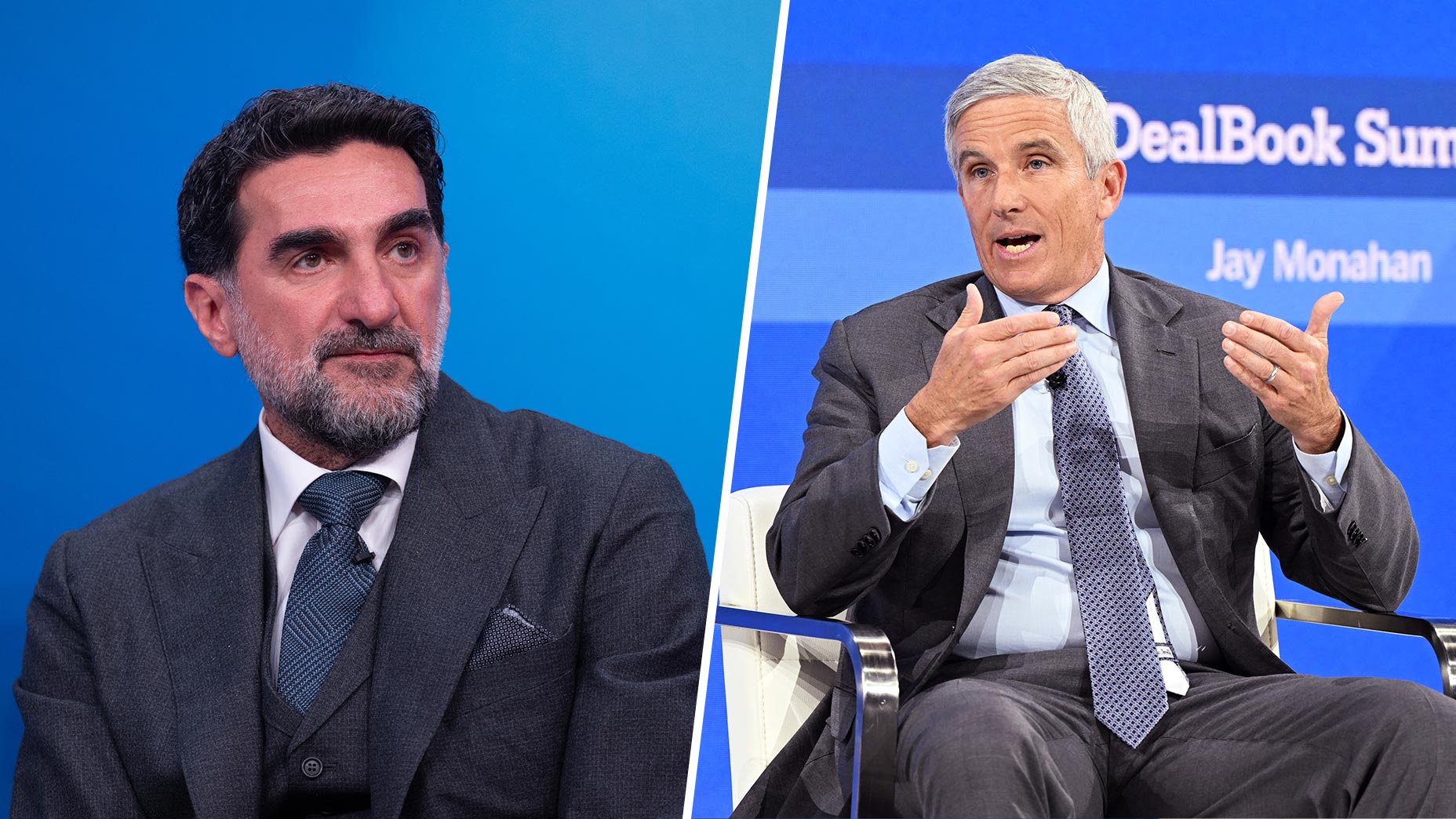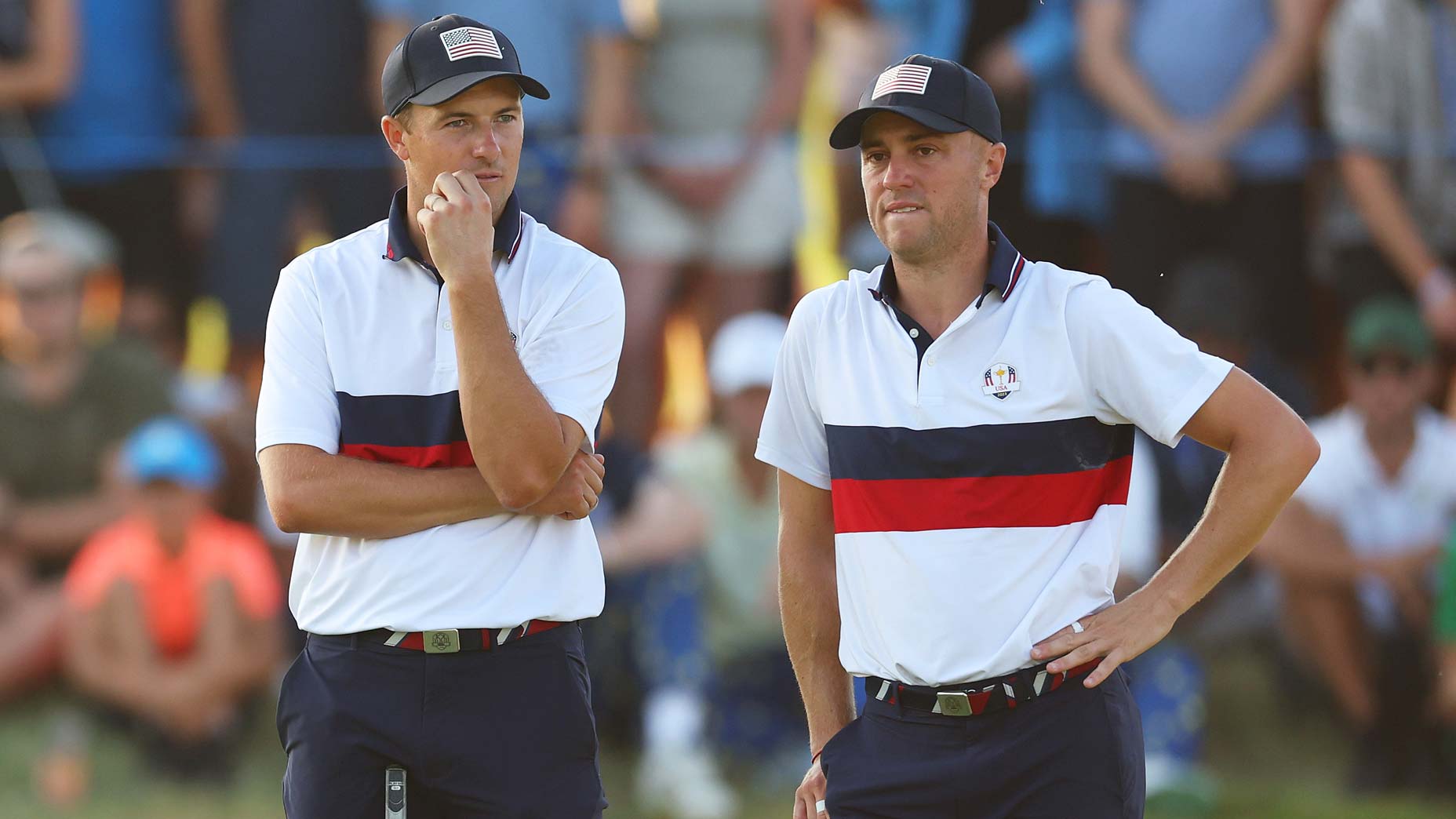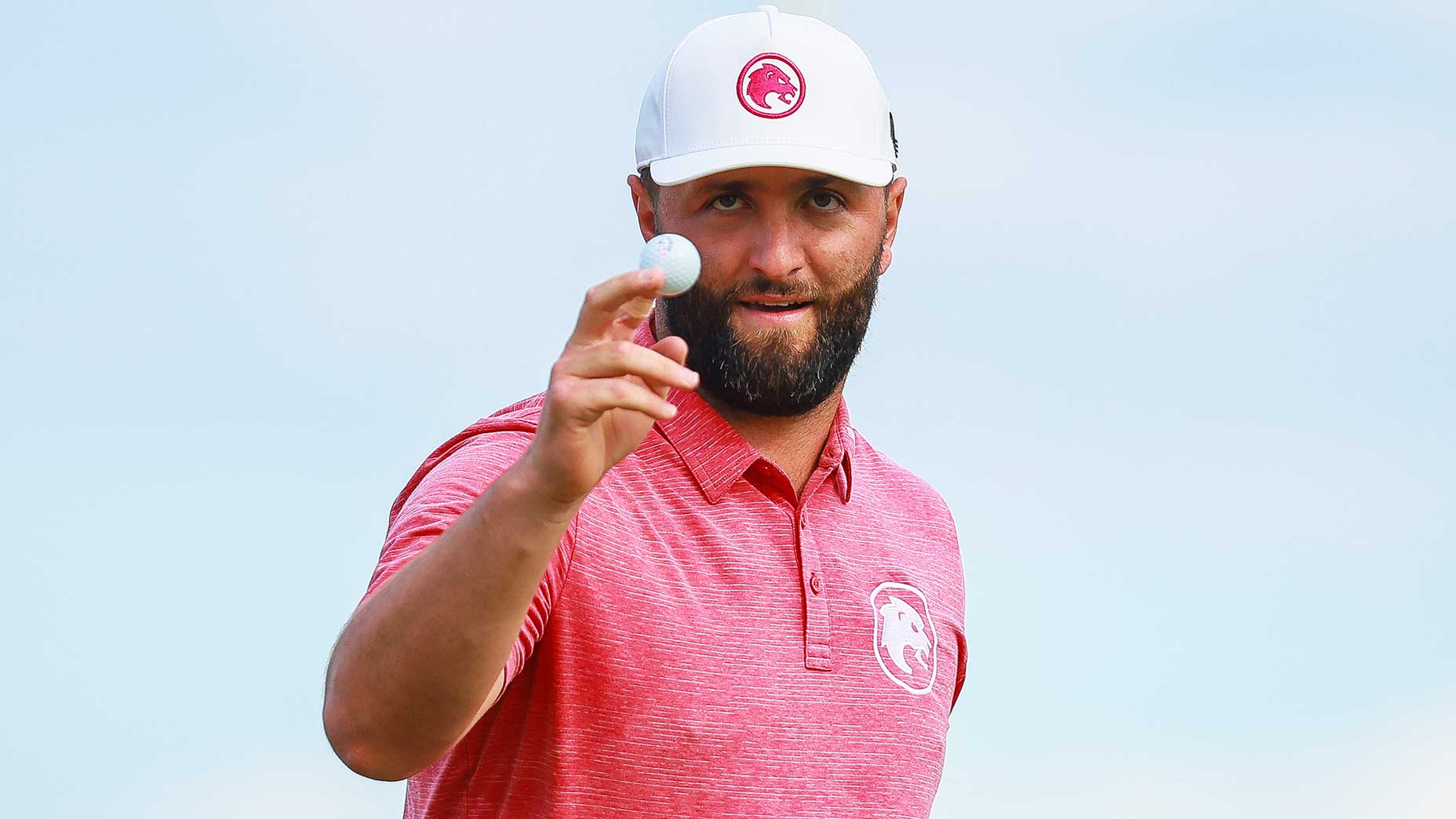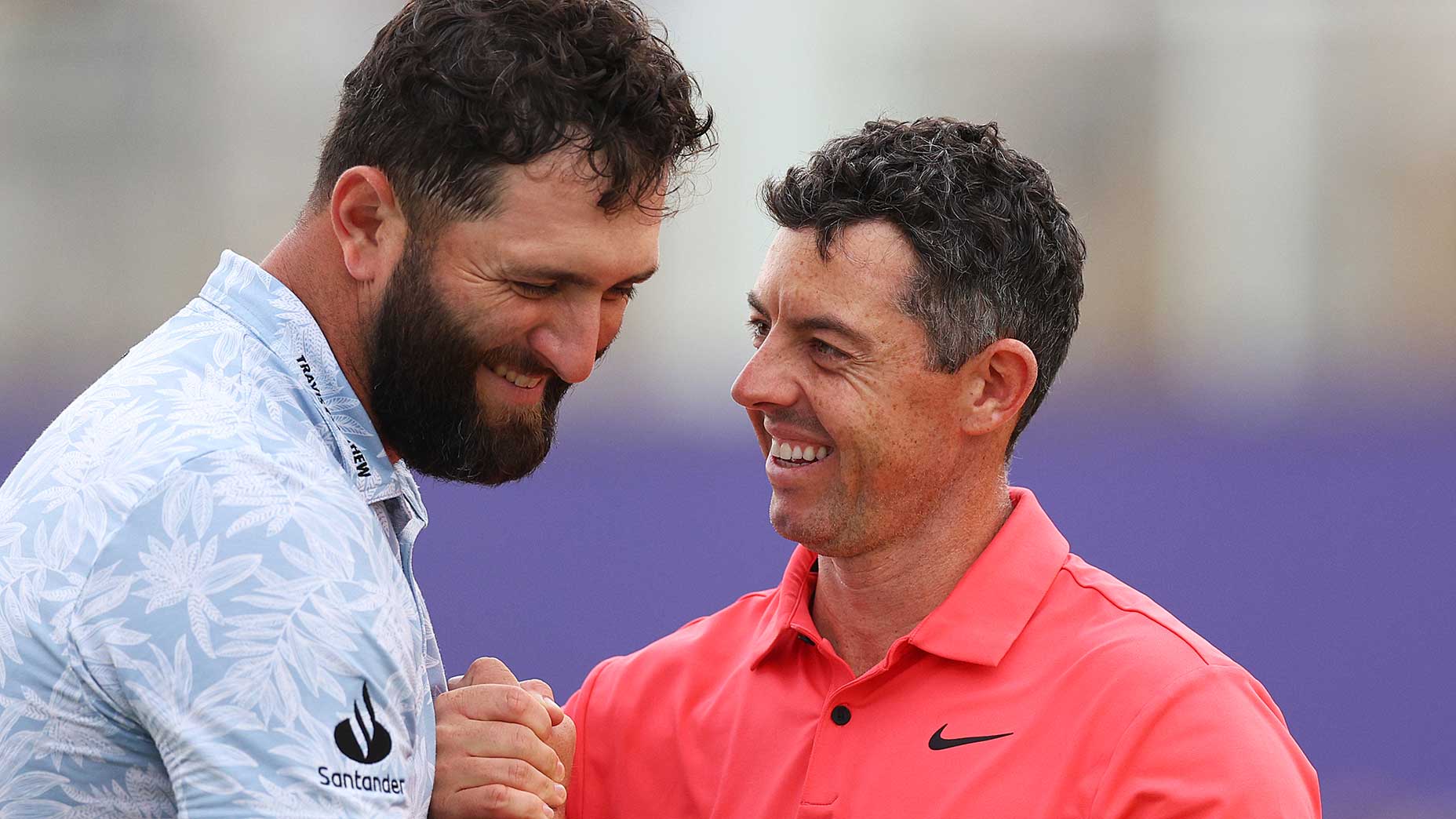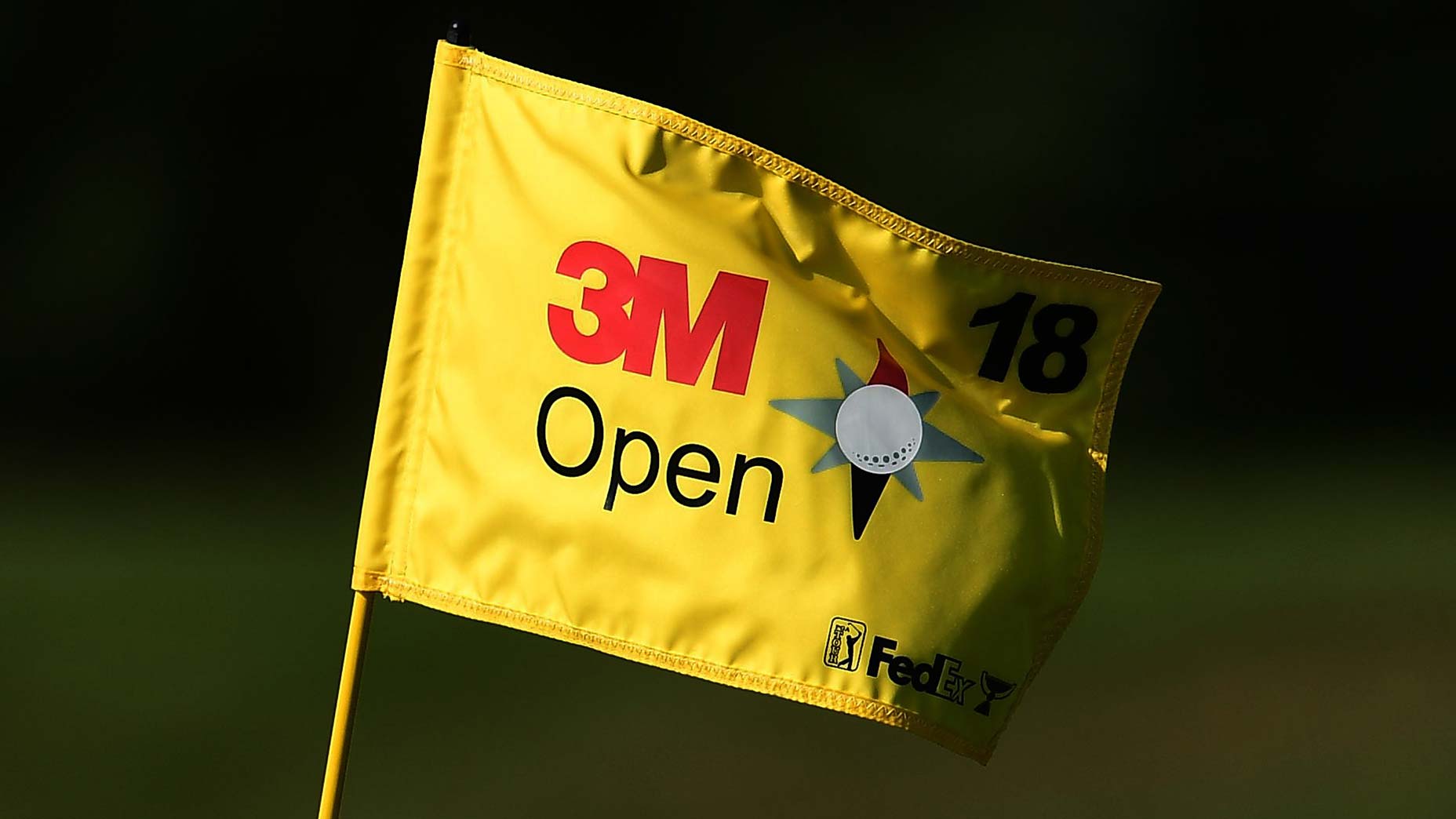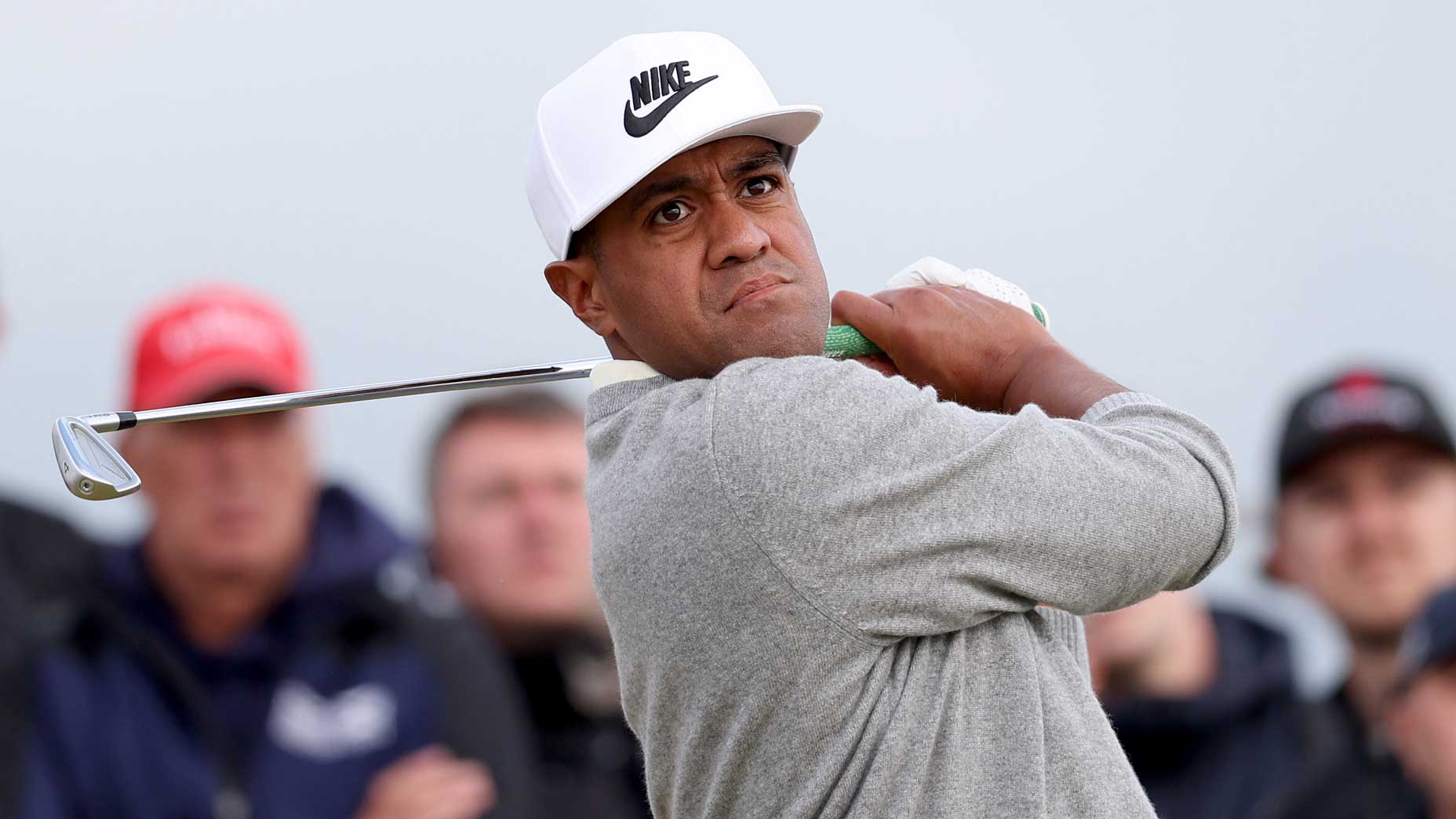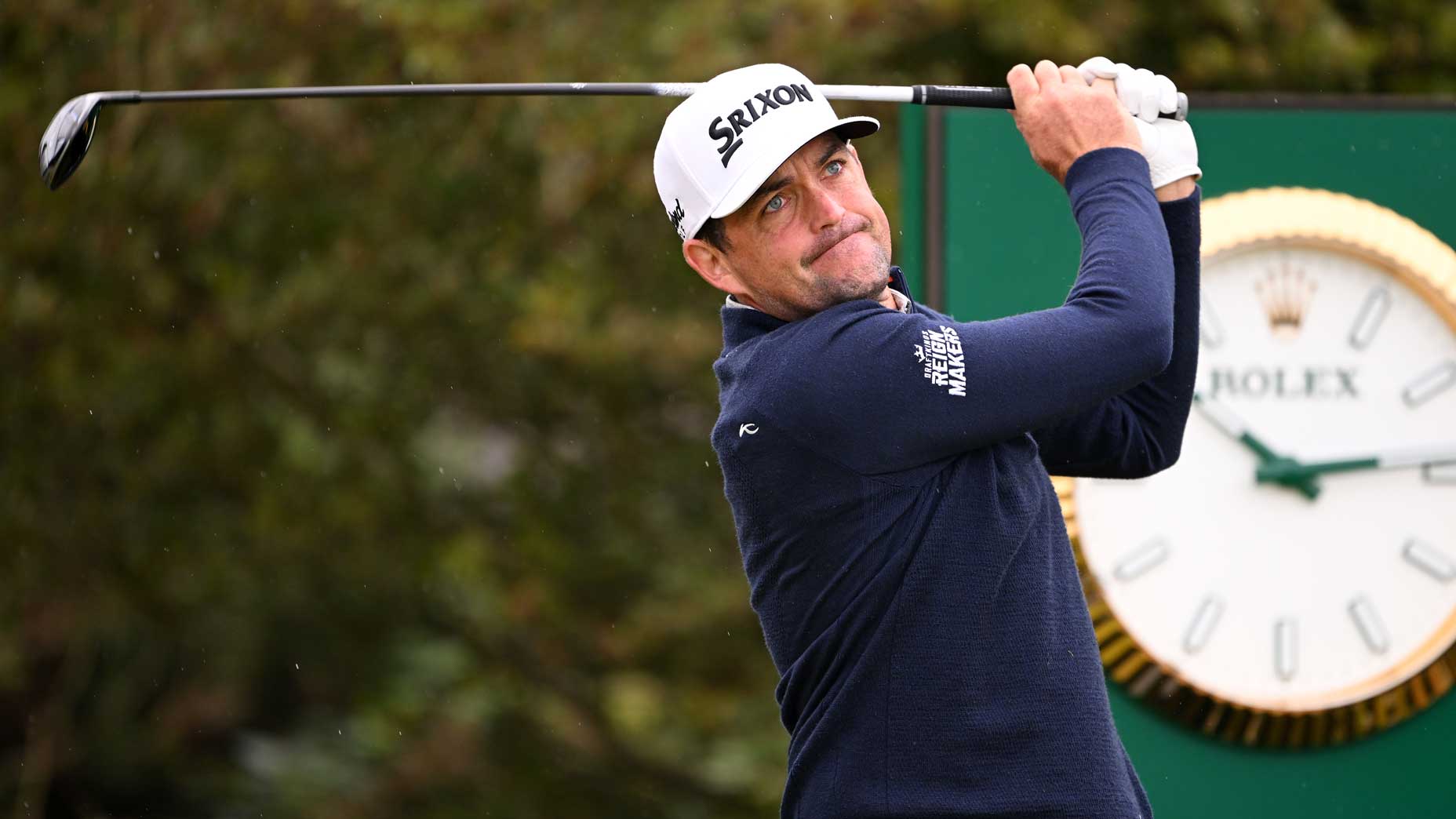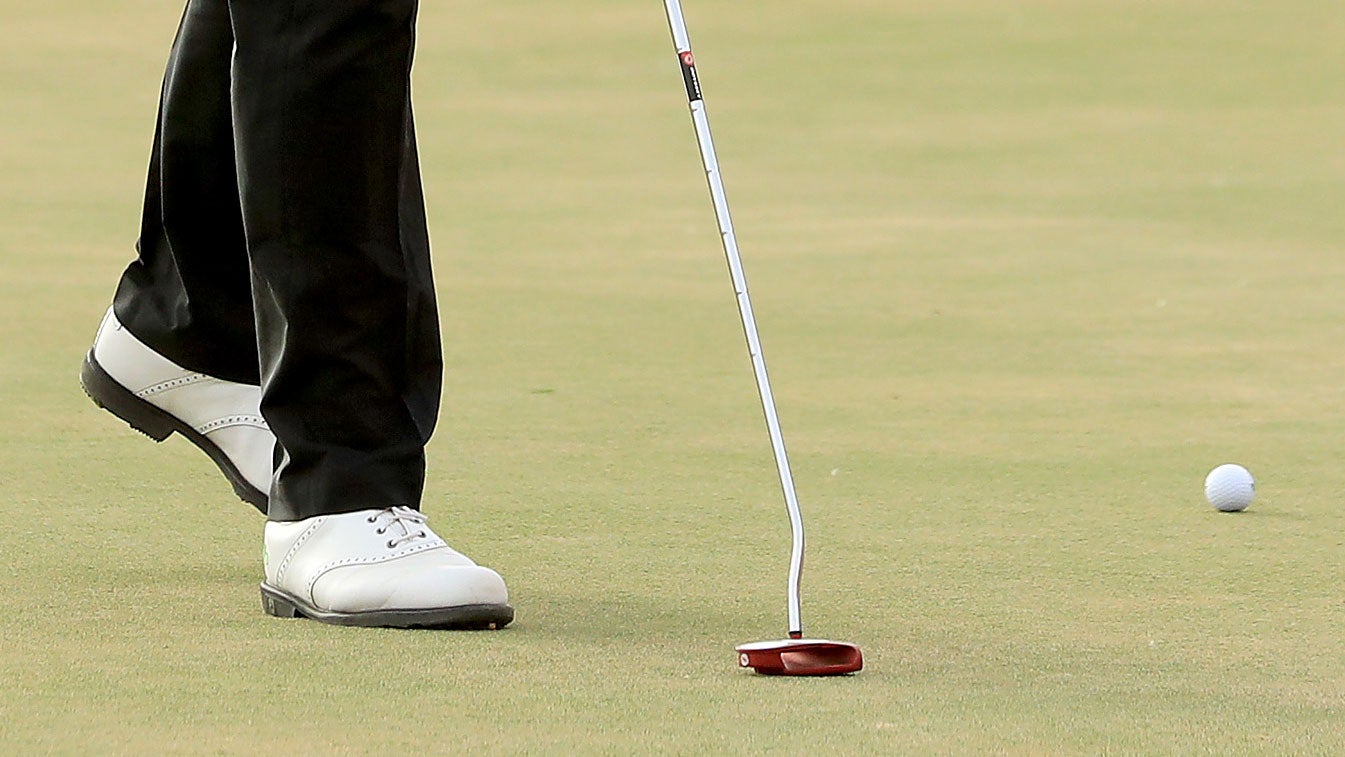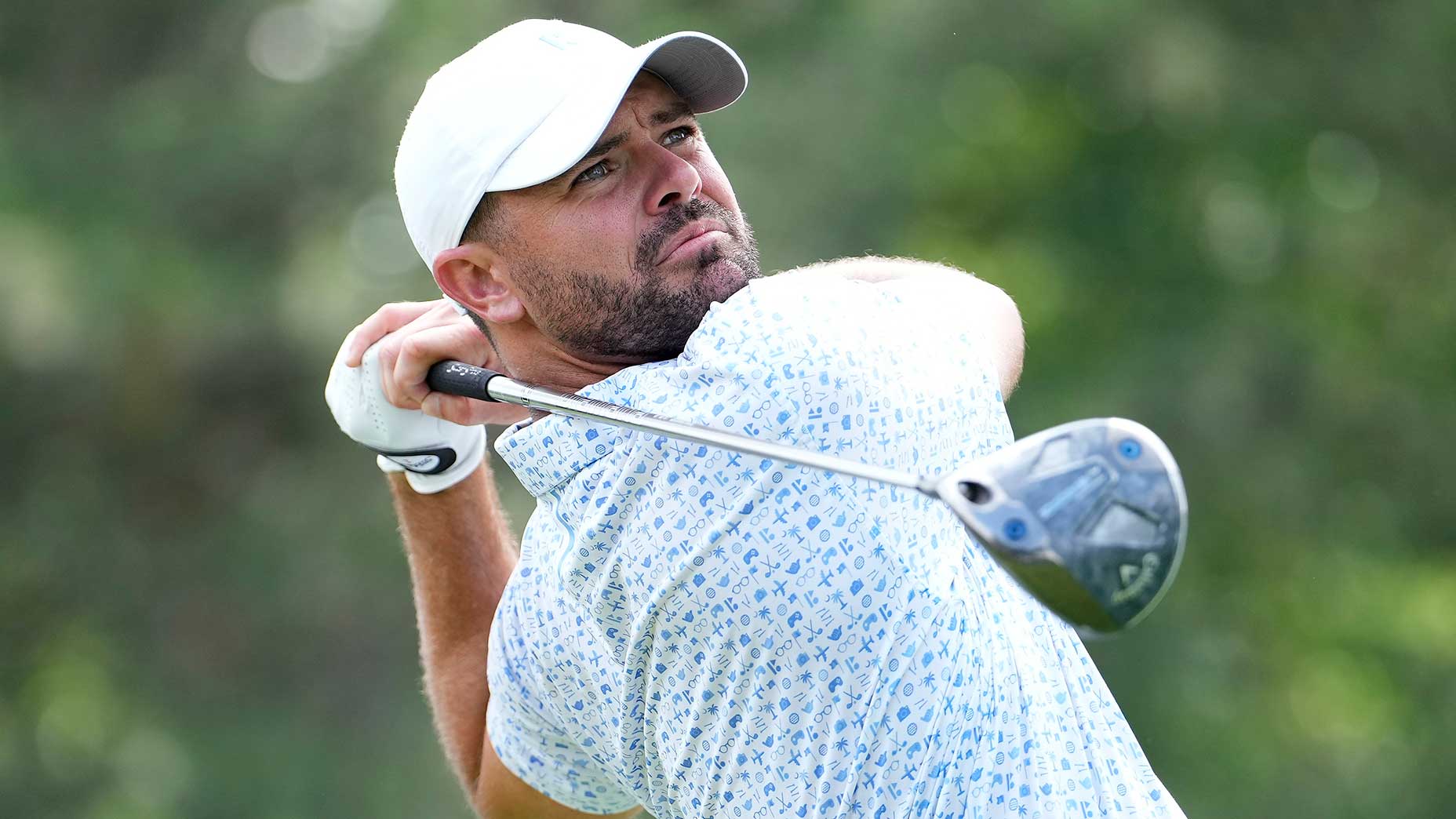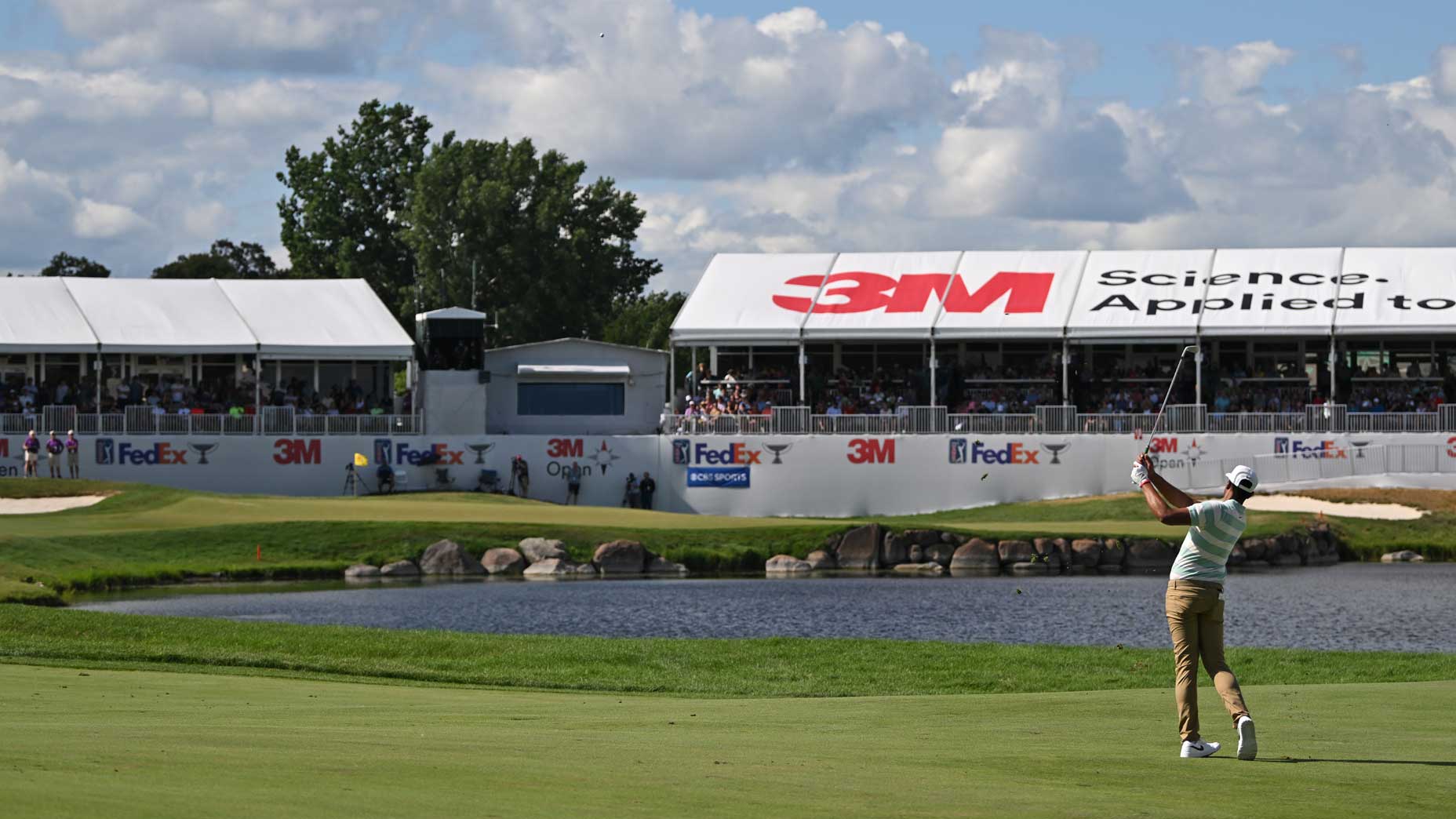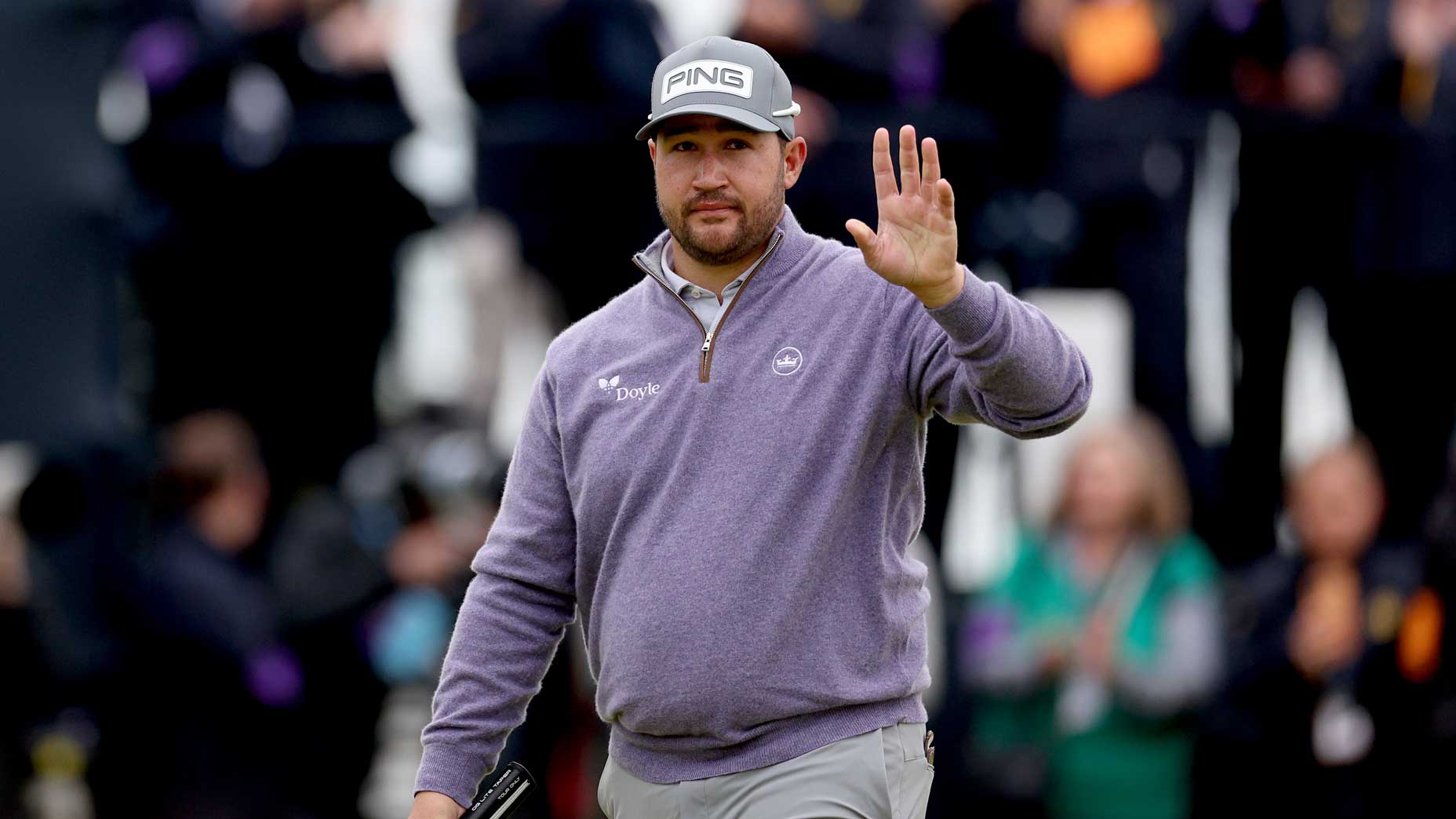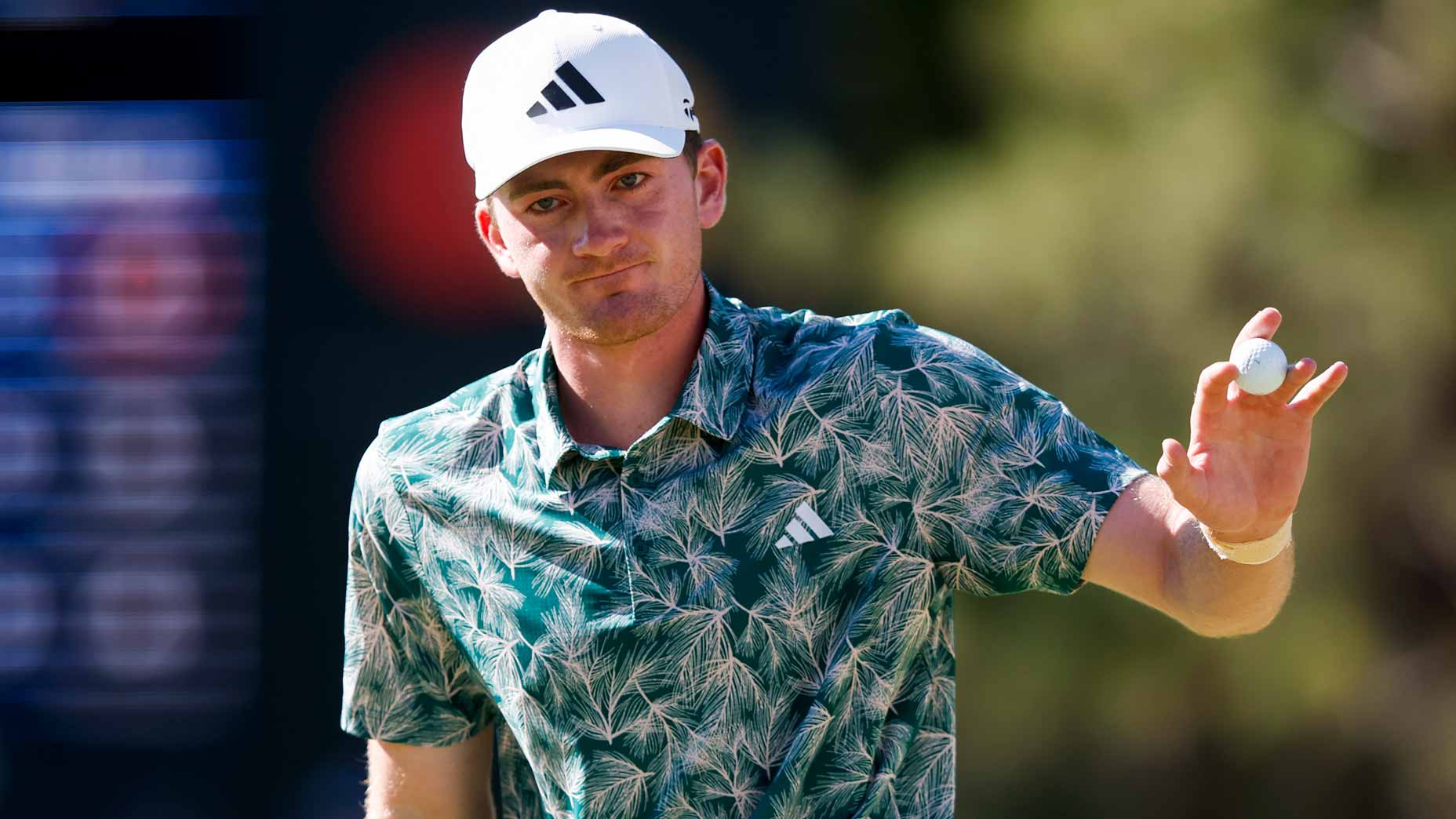Saudis, PGA Tour and what billions REALLY mean, as told by a leading expert
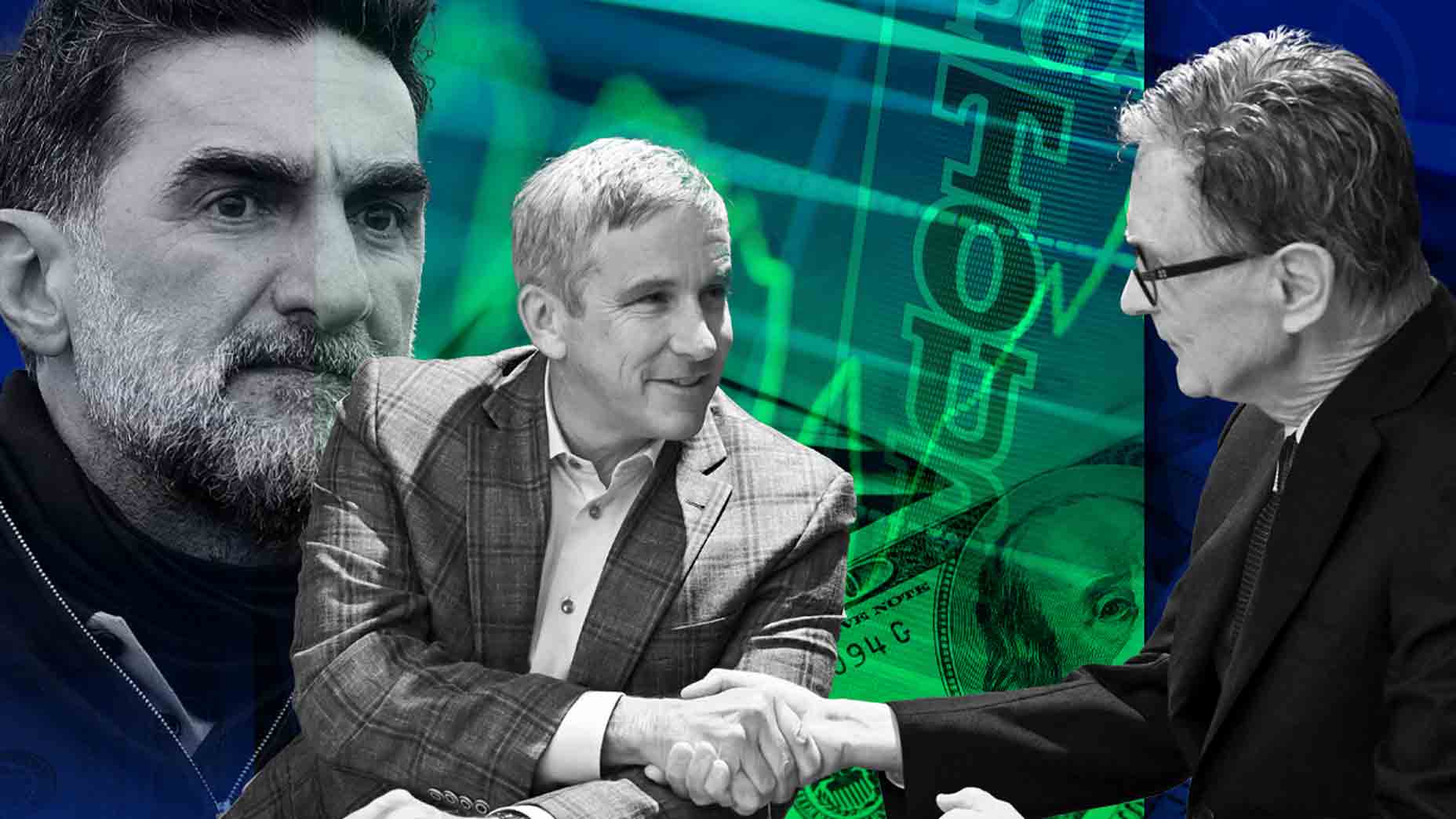
Getty Images illustration by GOLF's Adam Christensen
Let’s talk about the Detroit Lions.
Dave Berri loves to. He works in sports economics. He’s a professor at Southern Utah University in the field. He’s written numerous books and articles on it. He has a Wikipedia page. On and on. He’s an expert. Maybe the expert. He’s also a Motor City-born Lions fan, which means you bleed silver and blue, and Barry Sanders still jukes through your head. And this season, fans felt bigger than Calvin Johnson, who conducted his business under the nickname Megatron on his way to the Hall of Fame. Detroit won the NFC North. It was one win from the Super Bowl. It was heavenly — if only because most every other Lions year felt like hell. The faithful had had more NFL draft websites queued up than they’d care to admit, because they’ve endured more 4-12 years than they can remember.
Berri, though, is wise, and he prefers happiness over being sacked in the soul. He quit those Lions years ago, and he’s returned to the flock only now, once Detroit was good.
LOL.
Yeah, sure.
“I tell my students,” Berri told me the other day, “being a Lions fan is like going to a restaurant every week and getting a horrible meal and then just keep coming back and saying, ‘I know it was bad last week, but I think they got a new chef, I think it’s really going to work, this is going to be totally different now.’ And then you get the meal and you’re, oh, it’s still horrible.
“But I got to keep coming back. I’m going to be here the day the meal is good.”
I hate to say it, I told Berri.
But yeah, that’s insane, man.
“But that’s what sports fans are,” he said. “That’s exactly what sports fans are.
“The people who watch golf are the same way. If you are a person who likes watching major golf tournaments, you’re not going to stop doing that, you’re not going to give up on that. This is what you like doing. Fans are like that. They say things. They often say stuff — if you do this, I’ll go away.
“You’re not going anywhere.”
And you mostly haven’t. Men’s pro golf is life. You still wear your red on Sundays. You still eat your pimento cheese in April. But what now? You’ve been saying that often these past couple years. In 2022, LIV Golf, behind billions from the Saudi Arabia Public Investment Fund (PIF), launched, and players from the PGA Tour, the established brand, bolted. A year later, the Tour and the PIF shook hands over a funding arrangement. But seven months later now, and they’re still talking — and the Tour just took another deal, from something that christened itself the Strategic Sports Group (SSG). The Tour’s players are now suddenly flush with dough, though the whole Tour-LIV tussle remains. And no, not once did this paragraph mention a single stroke played.
I phoned Berri.
We talked for a couple hours.
The impetus was the Tour’s deal with the SSG, announced last Wednesday, though clearly that does not stand alone. Thankfully, we have a guide. To shepherd our conversation, we’ll lean on the PGA Tour’s statement on the SSG deal, which started this way:
The PGA Tour — in partnership with Strategic Sports Group (SSG) — announced Wednesday the launch of PGA Tour Enterprises, a new commercial venture under the PGA Tour’s control, and in a first-of-its kind program, nearly 200 PGA Tour members will have the opportunity to become equity holders in this new company. PGA Tour Enterprises is also considering participation by future PGA Tour players that would allow them to benefit from the business’s commercial growth. Under this program, players would collectively access over $1.5 billion in equity in PGA Tour Enterprises. …
The transaction announced today allows for a co-investment from the Public Investment Fund (PIF) in the future, subject to all necessary regulatory approvals.
That’s the news.
Which includes:
— A collection of mega-rich sports owners;
— A country with an investment fund that’s worth a reported $700 billion;
— A legacy sports league;
— Players suddenly becoming owners
There are layers, including another very valuable one.
You, the fan.
Here is my conversation with Berri, lightly edited for clarity and divided into six themes.
I. STRATEGIC SPORTS GROUP
As part of PGA Tour Enterprises, SSG, a consortium of American sports team owners led by Fenway Sports Group, today closed on a major financial and strategic investment of up to $3 billion. SSG is investing an initial $1.5 billion into PGA Tour Enterprises and will provide strategic focus on maximizing revenue generation for the benefit of the players and on finding opportunities to enhance the game of golf across the world. — PGA Tour statement
But why?
Why would, to name a few of these folks, John Henry (principal owner of the Fenway Sports Group) and Steven Cohen (owner of the New York Mets) and Arthur Blank (owner of the Atlanta Falcons) suddenly drop over a billion dollars into pro golf?
Our conversation started about there.
DB: “Why are you putting billions of dollars — what’s the motivation here? When it comes to men’s sports, and you can see this when you look at sale prices of franchises in men’s sports, you can see this when you look at investment in new leagues, you can see this with this deal — the financial numbers don’t likely justify the investment. … So the ratings seem relatively flat. They’re not — golf is not suddenly exploding. It’s not suddenly that they’re going to find twice as many fans.”
NP: “As we dive in, this is exactly the reason why I’m calling. We’ll get into that. Please keep going.”
DB: “If it were the case that you were saying, hey, in the numbers, this is a growth industry, and global viewership of golf is going to suddenly double, and somebody said, I want to get in on that business, well, then, you might have a justification to put billions of dollars into it, right? Because that’s an asset; that’s going to be worth something in the future. But when you look at the numbers, you’re like, that’s not what’s going on here. Golf is not suddenly becoming hugely popular. It’s as popular as it’s ever been.
“So what’s motivating you? Well, the fact of the matter is, you have to get at why people invest in sports, and it’s often not because of money — it’s because sports gives the owner something. And this is something I point out to students — go through the 500 richest people in the country, and see how many of those people you actually know, that you can name who they are. Now the people at the very, very top, who are the ultra, you might know a few of them. Bill Gates, right. But as you go down the list, you’re going to see a lot of people who are fabulously wealthy — and you’re going to be like, I never heard of that person.
“Now, what you’ll notice as you go down the list, any time that person owns a sports team, now I know them. Sports changes their image. It allows them to say, hey, I’m part of this, and then people know them. That’s why they invest in it.
“And just looking at this deal and looking at this sudden investment, it appears that the Saudi investors were coming along and saying we want to do professional golf, we want what that will provide us. We’ll be connected with that, and that will change our image. And then a bunch of American billionaires said, ‘But we don’t want you doing that, that’s our toy, we don’t want you taking our toy away. So now we’re going to invest in that.’ And so what you’re ending up here with is the same thing that you see whenever an NFL team sells. Forbes will come along and say, this team is worth $1 billion — and the sale price is announced, and it sold for $3 billion. Why would it sell for $3 billion when it’s only worth a billion? Well, because there’s only a few of those assets out there, and there’s a bunch of people who want it and they’re all bidding for it, and that bids up the price, and voila, the person who pays for it pays a lot more than you would expect given the financial data.”
[Some background before we continue. In 2022, LIV Golf was launched, behind the backing of the PIF. Had the Saudis ever approached the PGA Tour before LIV? In one of the best stories on the topic, the New Yorker’s Zach Helfand was told in 2022 by a then-LIV Golf official that the Saudis once wanted to make a billion-dollar Tour investment, but were turned down; the Tour, however, denied they were approached.]
NP: “Correct me if I’m wrong, but the takeaway that I had there is that is it really as simple as, in the question of why they invested, is it really that they’re trying to save an American sport?”
DB: “Obviously we don’t know that. I’m not going to say that. But if you go through all of the other possible explanations and the other obvious possible explanation is, this is a giant growth industry, I’m going to invest billions of dollars in this because I hope to make extremely large amounts of money, then my question is, why didn’t you do that 10 years ago? It would have been the same story 10 years ago. Why do you suddenly think golf is worth all this investment? I think the question that anyone should ask is if I take the Saudis out of the equation — they’re not involved anymore, they’re not doing anything — are you really able to get billions of dollars from people to invest in PGA golf when they weren’t doing that before. I don’t think that’s reasonable. It does feel like the Saudis came along and said, ‘Look, we want to take this over,’ and a bunch of Americans said, ‘We don’t want you doing that.’ And you’re like, ‘OK.’ …”
NP: “What would the sports owners expect on an investment?”
DB: “Hopefully you don’t lose all the money you put in. Again, I don’t think that they’re doing this because they hope to get a return. I think the hope is, you don’t want to lose the money. You’re not just throwing the money down a hole.”
II. PGA TOUR
“Today marks an important moment for the PGA TOUR and fans of golf across the world,” said Jay Monahan, commissioner of the PGA Tour and CEO of PGA Tour Enterprises. “By making PGA Tour members owners of their league, we strengthen the collective investment of our players in the success of the PGA Tour.” — PGA Tour statement
Now what?
The PGA Tour has new money. Where’s it going? Why didn’t it try to get it before?
Our conversation continued.
NP: “With the money that the Tour got, what would be your guess at how they would spend it, outside of the player equity?”
DB: “That’s a damn good question. Who the hell knows. What other asset do you have besides the players? What do you got? What are you going to do? Put in scoreboards? I mean, I don’t know what the investment is for. They don’t have stadiums. I don’t know what the investment is. That’s a real good question to ask them. What are you going to be using this money for? It doesn’t really make a whole lot of sense. See that’s the thing about it — what’s the call for investment in? And it seems like the call for investment is, I need to give the players money so they don’t jump to this other league and that’s it. And if that’s the motivation, then what’s the return on that investment? There’s no return on that.”
NP: “Could it be, perhaps, to enhance the viewing process? There’ve been rumors that they might invest where they’re not so dependent on commercials for broadcasts. Or broadcasts might be longer. Something like that where then where people are more bought in.”
DB: “Sure. How much of an investment would that possibly be, though? Also if that was that big of an investment and that big of a return on that, you would have already done that. I mean, you can. They can do things like that. I just don’t see that that’s worth billions doing that. “
NP: “With this investment, the Tour had noted that they had come to a valuation of $12 billion. Does that sound right?”
DB: “It could be. Yeah, maybe. If you put that in perspective, the NBA’s revenue each year is $10 billion, so the entire league is worth multiple many times more than that. So the NBA, just off the top of my head, would be $100 billion. So the PGA is about a tenth of the NBA. That’s probably about right, given the fanbase. Sure, that’s probably not unreasonable.”
NP: “Should the PGA Tour’s commissioner have looked at outside investment earlier, or was the Saudi-backed investment in golf inevitable, no matter what steps the Tour took? Like this was going to happen regardless of anything that the Tour could have done five, 10 years ago?”
DB: “I don’t think they could have done anything to stop that. No, I don’t think this could have been anticipated, or they could have done something. I doubt sincerely you could have gone to investors 10 years ago and said, ‘Look, give us a few billion dollars because we think there is a potential threat that somebody in another country is going to buy up golf.’ I think people would have said, ‘What? I’m not going to do that.’ Until the threat appeared, there’s no way in the world you could have done anything about that. I don’t think this is a question of mismanagement of the Tour. That’s why I also think that when they say, we’re going to invest in the broadcast and we’re going to make this a better product, if that was already truly important, you would have already done that. And it probably wasn’t important, so that’s why he probably didn’t do it.”
[Some background before we continue. In 2022, the Premier Golf League, a proposed, similar-style tour to LIV Golf that believed it could generate $10 billion of equity value by 2030, had sought a meeting with the PGA Tour, but a deal never materialized. Notably, too, in March of last year, Phil Mickelson shared this on Twitter: “Before I left [for LIV Golf] I brought a $1 billion commitment from a current PGA Tour partner to have 8 elevated events and give equity and ownership in these events to the players. JM’s [Jay Monahan’s] quote was “I don’t believe the league is going to happen so we won’t be doing that.” No vote, no discussion.”]
III. THE SAUDIS AND LIV GOLF
The transaction announced today allows for a co-investment from the Public Investment Fund (PIF) in the future, subject to all necessary regulatory approvals. — PGA Tour statement
In addition, today the PGA TOUR confirmed progress in its ongoing negotiations with PIF on a potential future investment and both parties are working towards an ultimate agreement. SSG has consented to an investment by PIF, subject to any necessary regulatory review and approvals. — PGA Tour statement
The PGA Tour now has its SSG money.
But what about the Saudi deal?
Why are they in this in the first place?
Why hasn’t LIV Golf, despite numerous star signings, gained more traction?
Our conversation continued.
NP: “The Tour said they’re still going to negotiate with the Saudi PIF, which is another branch of this. There would be a couple of questions I would have with that. Would you see then that all three groups could sit at the same table?”
DB: “Yeah, I would expect that’s going to be the ultimate compromise. I would think that’s what’s going to happen. I think the concern that people had was that the Saudis were going to control everything. And I think that’s what they’re trying to prevent from happening. So this investment group that’s coming along says, ‘Yeah, we’re going to give you more bargaining power so that at the end, you’ll get a deal where one group doesn’t control everything.’
“And the Sauids also get something out of this. They get association with this. I don’t know that the Saudis’ ultimate goal would have been, we want to run everything. I think ultimately their goal was, we wish to participate in this. And that’s what they’re getting.”
NP: “As the Tour continues to negotiate with Saudi Arabia and the PIF, what would happen if there’s not a deal? Or the Tour decides now, they don’t want that money. Could the Tour potentially go toe-to-toe with potentially a $1 trillion PIF?”
DB: “Well, you would assume they couldn’t. My sense is if you try to go ahead without the Saudis involved and the Saudis have an incentive because they wish to be involved, then they would just go back to forming their own association and poaching the golfers they want. And there are golfers that will go with them. Then you’ll have two associations. It would weaken the PGA product a bit. The question is how long the Saudis want to keep throwing money at that. They do have a lot, so they could just keep doing that. I think a Saudi-alone venture is not going to attract very many fans.”
NP: “What about from the Tour side? Would they have a thought that we could potentially do this now? I understand that this is theorizing and we don’t know exactly what they’re thinking, but what would be the benefit of saying, ‘I think we can go at this with the money that we’ve gotten from these sports owners?’”
DB: I think what you ultimately want to do is you want to make sure you’re integrating everybody. And the reason why you want to do that is you’re more successful as a sports entity the less you fracture your talent base. This is a very old point in sports economics — two competing leagues is not a good outcome. You don’t want to have that. And typically the outcome of that is a merger of some kind. Because if you have your best talent competing someplace else, that’s not good for you. That means you can’t sell your product as the best. The ultimate level of sports is always you want to be able to say you’re the best in whatever class you’re in. So you want to be the top golf league, you want to be the top tennis league, you want to be the top football league. Minor league sports don’t do well because they can’t claim that.
“I think the question that I would have is if you turned down the Saudis, does that mean the Saudis just go away and give up on golf? I don’t know, it doesn’t feel like that’s what they’re going to do. … So the outcome going forward is — obviously this is just speculation, but it does feel like you’re getting the billions of dollars so that North Americans have a bigger stake in how professional golf going forward is organized. Because the alternative would have been the Saudis completely take over and they run everything.
“That’s what it feels like. It doesn’t feel like they’re doing it for any other reason.”
NP: “As an economist, what do you think the Saudi endgame is in this? We talked about them trying to diversify their economy but is there something more, or is that kind of it?”
DB: “My guess is that’s the primary … I mean, I think they are interested in changing their image. I don’t think that’s untrue. So this is a means to do that. But I also think it is the case that they have to be thinking that their current economic model, given that technology changes, can’t be considered a long-term strategy, right? If you have an entire world that is very focused on reducing its carbon footprint and investing in a tremendous amount of resources and doing that, and you’re the one producing the carbon, I think that’s a signal to you that the entire world is going to be leaving you soon. So you better be doing something else. …
“And so then the question is, what’s the something else that we are going to be doing?”
NP: “Knowing how Saudi Arabia has previously invested and how they’re trying to invest and obviously we talked about building their economy differently, would they want a return on investment, do you think?”
DB: “Some day. I think they might be making the same erroneous mistake that we do in North America, that thinking that you can build an economy around sports. I did an interview on public radio in Detroit a couple weeks ago where they were talking about how the plan to rebuild downtown Detroit was centered on building the stadiums and arenas for the sports teams. And you’re like, that’s a stupid plan; that’s not going to work. Sports does not generate economic growth and doesn’t generate jobs. You can’t build an economy around it. Nevertheless people keep thinking that can happen. And so they could be thinking that — this is part of a larger plan to build an economy around tourism, which, you know, I guess that’s not unreasonable. You would think at some point this would generate something. If they understood sports economics, they would understand that’s going to take a long time. Any amount of money you’re going to throw at this is going to take a long time to generate a positive return.”
NP: “In that sense, is there a spot where the PGA Tour could wait this out?”
DB: “Oh, that doesn’t seem likely, right, given the amount of money the Saudis have and their desire to be involved in this. The answer is no. I don’t think that’s one of their options because I think they can wait quite a long time.
“There’s an old famous quote from John Maynard Keynes, who’s a major name in economics. And he said this back 100 years ago — markets can remain irrational longer than you can remain solvent. And so you can sit there and say, I understand the market, I understand the fundamentals, I know what I’m supposed to do, but if a market moves in a specific direction, even if you’re like, I know that’s wrong, it can stay a lot longer than you can stay solvent. I think this is an example of that, where the Saudis are like, I can keep investing in this, even though I may never generate a return and this is a wrong thing for me to do with my money. Because I think it’s the right thing, I can just keep doing this and I can keep doing it longer than you can hold out. I think that’s true.”
NP: [As part of a response to a question of whether the SSG deal was made in light of government oversight of the Saudi deal — Berri believes that it was — the sports economist reviewed why he thought LIV hasn’t caught on as of yet among fans, at least at the level of the PGA Tour. Below are those thoughts.]
DB: “I did not believe that the Saudi effort was ever going to be phenomenally successful. They don’t have the majors. It goes beyond just having the golfers. If you went and got the best golfers in the world and you just had them randomly playing a tournament someplace, I don’t know that you’re going to get huge television ratings just for that. It does require that you have this history where people say winning that specific tournament means something because there is a history of that tournament that goes back to all these other people.
“That’s the big thing about sports is, the history all matters. It makes a difference that when the fan is watching, you can put this story in some sort of perspective. And that’s why new leagues, new startups, always have a problem. There’s no history. And so the fan is left with, I don’t know what I’m watching here. Is this significant? Does it matter? This is something you would see — you would imagine if you were to watch, say, a tennis tournament, where it was the tennis players at Wimbledon and then the tennis players a few weeks earlier at another grass-court competition, you’d expect at Wimbledon [that] they’re trying harder because it means more to them. And the same thing is true for the golf majors. It means more to them, so they try harder. So therefore the fan gets more out of it. But you take those same golfers at another tournament that doesn’t have the same history, I think the fans will be like, ‘How hard are you trying? Does it really mean something to you to win this?’ Or are you like, ‘This is just another tournament?’”
IV. PLAYER EQUITY IN THE PGA TOUR
“And in a first-of-its kind program, nearly 200 PGA Tour members will have the opportunity to become equity holders in this new company. PGA Tour Enterprises is also considering participation by future PGA Tour players that would allow them to benefit from the business’s commercial growth. Under this program, players would collectively access over $1.5 billion in equity in PGA Tour Enterprises. These grants — which vest over time — will be based on career accomplishments, recent achievements, future participation and services and PGA Tour membership status, and grants are only available to qualified PGA Tour players.” — PGA Tour statement
Tour pros now have a stake in the Tour. OK. Is that good? Bad? Irrelevant?
How else might the SSG money be spent?
Our conversation continued.
NP: “What can the golf fan take away knowing that the players have equity in their product now? What does that mean to a fan?”
DB: “It doesn’t mean a damn thing. They don’t care in the slightest. All that matters is the golfer you’re rooting for wins. And that’s it. They don’t care. This is the thing about sports that’s been pretty clear over time — nobody cares what they’re paid, nobody cares how much they have, nobody cares about any of that. If I’m rooting for you, I want you to win. If I don’t root for you, then I want you to lose. And that’s it.”
NP: “Is there a benefit to a pro golfer in being an owner in their product?”
DB: “I don’t think so. It means they get more money probably. But no, not really. I mean, at the end of the day, they’re golfers. They’re focused on being golfers. Their success depends on their success as a golfer.
“Is there an argument that potentially that they do think they want to get more investment, or they don’t want the investment to go away? That they would do creative things, or work harder at their game, that there is a bigger return?
“Can they work harder? I mean, are there golfers who are slacking? That doesn’t seem reasonable, right? If a golfer suddenly shows up and says, ‘Hey, suddenly, you won the Masters, what happened?’
‘Well, I became a private equity owner so I actually tried.’
‘Like, really? You weren’t trying before?’
‘No, I was just totally mailing this in and now I’m an equity owner so now I’m actually putting some thought into this.’”
“On the flip side of that, the question would be, ‘Well, I’ve got money in the bank now, I don’t have to work as hard.’ Is there a possible detraction to being an owner in your own sport?
“No. That’s another thing about athletes. That doesn’t seem to motivate them, either. There’s a few examples of athletes getting money and they stop training. But that’s not the typical reaction of somebody who becomes a professional athlete. To become a professional athlete, you have to invest so much effort to acquire those skills that the money doesn’t matter as much. …
“And so the money is not — it’s hard for people to understand that when they’re in jobs that aren’t like professional sports. I have trouble explaining that to my students. I do a lot of writing. I do a lot of research. Why? Do you get paid for that? No. I mean, a little. Not enough to make me do it. Why do you do it? Well, I get to talk to some guy from GOLF.com for an hour. I get to do stuff like that, and you don’t get to do stuff like that. And so I get to write and people get to read what I say and I think that’s cool and it’s fun to figure problems out and stuff like that. The other professors in my department who no one ever talks to, they get paid roughly the same I do. You’re motivated by other things in life. And I think athletes are motivated by other things.”
V. Billions? Billions.
A major financial and strategic investment of up to $3 billion — PGA Tour statement
Really?
For … pro golf?
Our conversation continued.
NP: “This taps into your expertise as best as possible. As there continues to be more spending and more spending — the Jon Rahm signing was reportedly $500 million — the question I would have is: Is pro golf really worth this much?”
DB: “No.
“No.
“That seems unlikely. No, it’s not. You said it yourself, it’s a niche sport. It is a global sport, but it’s clearly not on the scale of the other major sports in terms of what generates — and I would point out overall, sports itself is rather small business. …
“I think there’s a sense because these people interact with powerful people that they think they themselves are powerful people. You know, we’re important. It’s like, no, you’re entertainment. One of the odd things about sports is, it generates a whole lot of — it dominates people’s lives in a way that other things don’t.
But sports doesn’t do a good job of capturing the value of that. They don’t seem to be able to monetize completely all of that. Because a lot of what we do in sports, we don’t actually pay for it. We consume it by watching the games on television or looking at internet sites. I don’t think they monetize all that very well. Imagine if you said to sports fans, every moment that you think about this, you’re going to have to give me 25 cents. You know, because this is a big part of your life, and I want you to pay me for the fact that I’m giving this to you. Then their revenues would be phenomenal, right? There would be billions and trillions of dollars, right? Because people literally spend all this time in the world thinking about this stuff.
“In a world where you actually did monetize it, you’d have this uncomfortable conversation a lot of households are having. Wait a minute, it says your Detroit Lions bill this last month was $357. What the hell are you doing with all your time? Well, they made a bunch of free agent moves. I spent a lot of time thinking about it. Oh my god. This is ridiculous. Quit thinking about that. I can’t stop myself.”
NP: “This is a question that I’m very interested in, whether the spending, spending, spending is creating some sort of scenario where if that money left and these players and these events and whatever were expecting that money and it wasn’t there anymore, then would pro golf crash? Are things heading that way at all?”
DB: “Nah. No, I don’t think so. I don’t think so. No, it wouldn’t happen that way.
“The institutions exist, the fandom exists for those institutions and it might cause a recalibration of what you pay out for the tournaments and stuff like that, but nothing is going to crash. No, these things all exist and will keep existing.
“That’s the thing about sports — it doesn’t ever do that. This is not like a Taco Bell. It’s not a cardboard factory. This just keeps going on and on and on. It’s such an odd thing because we talk about sports as a business and then we use business terms — what are the revenues, what are the costs, what is the financial picture. But it’s not just a business — it’s a consumption product. People buy into sports teams the same way they buy a yacht. It’s a consumption thing. I’m an owner of this team because I get something out of it. …
“You could go to these Saudi investors and say, ‘You know what you could do with your trillion dollars, is you could create a fast-food restaurant empire that goes around the world. And you could make a huge return on that.’ And they’d be like, ‘True, but I don’t care about that. Why would I want to do that?’”
NP: “It’s like you were saying with the Forbes list — I don’t know who the Taco Bell owner is, but I know who the Milwaukee Brewers owner is.”
DB: “And that’s exactly why they’re doing this. They’re not doing this to make money. I would imagine ultimately the billionaires would probably put it this way to you — I don’t need to do this to make money, I already have money. I already have money, so I’m not looking for money, I already have the money. If I wanted to make money, what I could do is just take all my billions and put it in a diversified stock portfolio and I could go sit at the beach. I would make money. But I don’t want to do that. So I’m looking to spend my money. See that’s what they’re doing — they’re wanting to spend their money. So when we look at their decision about should you buy professional golf, we can’t look at it and say, ‘They’re doing it because they want to make money.’ No, if they wanted to make money, there’s lots of things they could do to make money and they already have money. What they’re doing is, ‘I wish to be part of something. And I want you to pay attention to me. And ideally you’d pay attention to me because I was a great golfer and therefore you pay attention to me.‘
“But it turns out I’m not a great golfer. So I’m going to do the next best thing — I’m going to go buy a bunch of great golfers. So there you go. I think we have to understand that — that’s the thought process they’re going through.
“I think we make a mistake when we try to analyze sports business decisions purely as a business decision.”
VI. You, the fan
“Fans win when we all work to deliver the best in sports entertainment and return the focus to the incredible – and unmatched – competitive atmosphere created by our players, tournaments and partners.” — PGA Tour statement
This story was purposefully started with a story about fans.
They’re damn important to sports.
But they’re also neglected.
Or maybe it’s more accurate to say they’re taken for granted.
Our conversation ended here.
NP: “How does the pro golf fan win out of all this?”
DB: “They’re not part of the conversation really.
“That’s really a hard thing for sports fans to understand. But because you’re addicted to the sport, you don’t have any bargaining power. This is the way it works in a restaurant. If I go to Taco Bell and I don’t like my order, I can complain to the 16-year-old who made it and maybe something will happen. But I can take my business away. So I have bargaining power. But what are you going to say as a sports fan to an owner — if I don’t like this, I’m going to quit. Are you? No, no there’s no chance I’ll quit. Because how many hours have you spent watching golf in your life? Hundreds of hours. So if I do this, you’ll be pissed off and you’ll entirely change your entire life and stop doing that? No, I’m not going to do that.
“This happened every time when players would go on strike in sports leagues. Fans would come out and say, ‘I’m never coming back.’ I’m sorry, you spent your entire life watching baseball. You mean you’re giving all that up? Yes. No, you’re not. That’s ridiculous. You’re not going to do any of that. The minute they play, you’ll be back in the stands, you’ll be back watching. And nothing is going to change. Because your whole life is built around these things. And you can’t let it go. You’re addicted to this. And the owner knows that. And that’s why it works out the way it does.”
NP: “How does the pro golf fan lose out of all this?”
DB: “As long as the tournaments keep happening — I think the big thing you should worry about is the top golfers not showing up in the top tournaments. And that detracts from the product a bit, right? So that would be an outcome that would be less than ideal. But beyond that, as long as the tournaments are going on and the best golfers are participating, then everything’s fine. And if it turns out the way this works out now is that top golfers just saw their pay tripled, ‘OK, whatever, I don’t care. It doesn’t make any difference to me.’ That’s irrelevant to them.”
NP: “Do they lose out if this quote-unquote war keeps going on for five years or so? And there are split tournaments every week?”
DB: “Yeah, I think from the perspective of the fan, that’s the outcome they don’t want to have. They don’t want to have players not all showing up. And that would be a problem. That’s not what they want. They want the players to all be there. So you want this to be resolved so that’s the outcome you get. You don’t want a situation you see in other sports where you have the American Football League and the National Football League, or the ABA and the NBA. You want to have all the best athletes all in the same league. And so that’s what you’re looking for. So that’s the only thing that’s bad.
“As long as that outcome is avoided, the fans are fine.”

